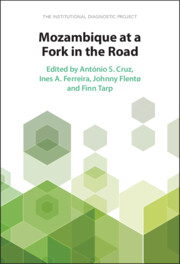Acknowledgements
It was with deep gratitude that we accepted the kind invitation from François Bourguignon and Jean-Philippe Platteau, research directors of the Institutional Diagnostic Project, to lead the Mozambique Institutional Diagnostic, a both challenging and rewarding task. François Bourguignon steered our work throughout, in person and online, and provided excellent guidance, without which this study would not have been possible. Sincere thanks are also due to members of the scientific committee, who accepted to engage with our work. The late Benno Ndulu as well as Celestin Monga provided very helpful advice and reviewer comments that helped sharpen our focus.
Furthermore, we wish to acknowledge the EDI team members at OPM, who contributed valuable insights and provided timely management assistance to the process of producing the Mozambique Institutional Diagnostic. They include Mark Henstridge, Stevan Lee, Umar Salam, Rachel Smith-Phiri, Benjamin Klooss, and Katie Mcintosh. We acknowledge the Inclusive Growth in Mozambique (IGM) programme as well for professional interaction and effective collaboration in relation to the organisation of key events in Maputo. Special thanks are due to Vasco Nhabinde, Enilde Sarmento, Fernando Lichucha, José Guambe, Patricia Justino, Sam Jones, Ricardo Santos, Eva-Maria Egger, Elina Penttinen, and Anette Camorai, as well as the IGM interns. Furthermore, we express our gratitude to UNU-WIDER for institutional interaction and copy-editing and translation support. Particular thanks go to Lorraine Telfer-Taivainen, UNU-WIDER’s Editorial and Publishing Associate, for all of her very careful, critically needed, and sustained editorial publication support, including the many exchanges with Cambridge University Press. Special thanks are also due to Siméon Rapin, who supported the production of the working papers. Christel Brink Hansen provided kind programme support at UCPH and colleagues in UCPH-DERG were helpful from beginning to end, including, in particular, Hanna Berkel who produced the country maps in Chapter 2 from publicly available data.
We also wish to thank the many participants who joined our workshops and seminars, and provided insights that helped us come to grips with the many intertwined issues related to the development challenges in Mozambique. They include the key informants who contributed time and insights alongside the respondents to our quantitative questionnaire.
We also thank the panel members in our Project Launch Workshop held on 12 June 2019, Jorge Ferrão, Zélia Menete, Magid Osman, and Laura Torvinen, and the moderator of the session, Julieta Langa. The same goes for Leonardo Santos Simão and António Souto who served as key discussants at the Draft Report Launch that took place on 4 November, where we collected comments and input from a wide range of stakeholders. Denise Malauene, José Chichava, and Paulo Mole, all participated in the panel on this occasion, which was moderated by Sheilla Loforte and Sam Jones, and introduced by Enilde Sarmento and Fernando Lichucha. Particular gratitude is due as well to Tony Addison, João de Barros, Maria Ana Jalles d’Orey, Luis Magaço Júnior, Miguel Niño-Zarazúa, Vincenzo Salvucci, Damiano Stella, Herminío Sueia, and Rafael Uaiene. Together with colleagues already mentioned and chapter authors, they contributed with helpful written comments on the thematic chapters that are at the core of this volume.
Our most sincere gratitude goes to the chapter authors of this volume for their willingness to participate in this project, during what became a particularly challenging time due to the onset of the COVID-19 pandemic, and for their many insightful contributions. This goes, in particular, for António S. Cruz and Johnny Flentø, who also served as co-editors. Moreover, most helpful reviews and critique of the background and synthesis chapters were received from Tony Addison and Leonardo Santos Simão, as well as Sam Jones and Ricardo Santos. While it is our sincere hope that this final volume accurately reflects the advice and professional input referred to above, all the usual caveats apply.
Finally, a word of thanks for funding from UK Aid, and support to the IGM Programme by Finland, Norway, and Denmark.

